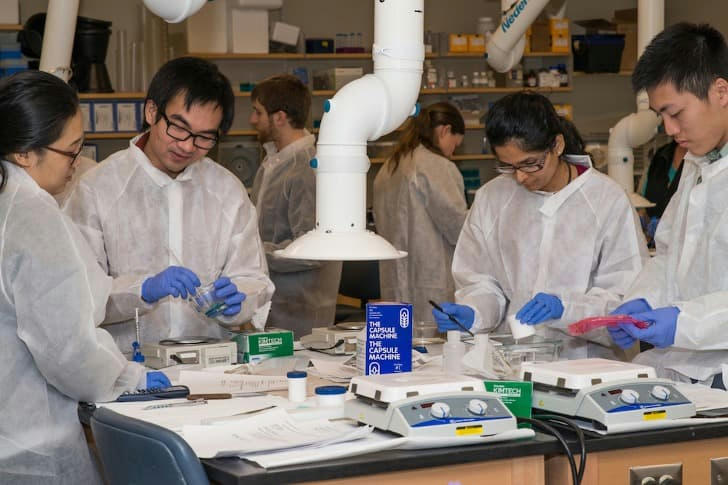Leading The Future Pharmacists
Pharmacists play a crucial role in modern healthcare systems. They are responsible not only for dispensing and distributing medications but also for medication management and health consultation with patients. As the medical field rapidly evolves, the responsibilities of pharmacists are continually expanding, making comprehensive and ongoing training vital. This guide explores the importance of pharmacist training, core content areas, and future trends to better equip pharmacists for their roles.

The Importance of Pharmacist Training
Enhancing Professional Competence
Pharmacists must possess a thorough understanding of pharmaceutical knowledge, including the latest developments in pharmacology, pharmaceutics, and clinical pharmacy. Through training, they can better understand drug mechanisms and adverse effects, thus improving medication safety and efficacy for patients. Staying updated with current research allows pharmacists to provide evidence-based recommendations and remain key contributors in therapeutic decision-making processes. Moreover, pharmacogenomics and biotechnological advances are reshaping treatment paradigms, requiring pharmacists to be at the forefront of these innovations to apply them in clinical settings effectively.
Adapting to Changing Healthcare Environments
With new drugs constantly being introduced and regulations updated, pharmacists need to keep their knowledge current to adapt to changing healthcare environments. Continuous training ensures they are informed about new medications, updated treatment guidelines, and evolving healthcare regulations, thereby maintaining their competitiveness and relevance in the workplace. Additionally, pharmacists are central to implementing public health initiatives, which require an understanding of epidemiology and global health trends. The ability to conduct health screenings and vaccinations further exemplifies their evolving role within community health.
Core Content of Pharmacist Training
Updating Foundational Knowledge
Training courses should cover the latest advancements in basic disciplines such as medicinal chemistry, pharmacology, and clinical pharmacy, ensuring pharmacists have a strong theoretical foundation. These courses must be designed to integrate new scientific findings, clinical trial results, and innovative treatment approaches. Interdisciplinary collaborations and engagements with research communities can further enrich learning experiences and application of knowledge.
Regulations and Ethics
Pharmacists need to understand national and regional pharmaceutical regulations and professional ethics to ensure drug management and patient consultations are conducted within legal and ethical frameworks. Ethical dilemmas are common in pharmacy practice; thus, case studies and role-playing exercises can be valuable training methods to cultivate sound ethical judgment and professionalism. Engaging with ethical review boards or workshops on bioethics can provide deeper insights into resolving complex issues.
Enhancing Practical Skills
Practical courses should include simulated dispensing, medication consultation, and medication management to enhance pharmacists' operational skills and professional sensitivity. Such hands-on training ensures pharmacists can confidently manage complex prescriptions, identify potential drug interactions, and counsel patients effectively. Advanced simulation technologies like virtual reality scenarios can provide immersive learning environments, making training more effective and engaging.
Digital Technology and Innovation
As healthcare digitalization progresses, pharmacists should be familiar with various electronic health record systems and medication management software to improve work efficiency and accuracy. Training in telepharmacy services and digital health tools can prepare pharmacists for virtual consultations and remote patient monitoring. Moreover, understanding cybersecurity principles is crucial for safeguarding patient data in a digital environment. Collaborations with tech companies can offer pharmacists unique insights into the development and application of new digital tools.

Future Trends
Personalized Medicine
Future trends in personalized medicine require pharmacists to have a higher level of biomedical knowledge to tailor medication regimens based on patient genetic information. Pharmacogenomics training will enable pharmacists to predict patient responses to medications and reduce adverse drug reactions. Collaborating with genetic counseling professionals can enhance this aspect of practice.
Remote Pharmaceutical Services
With the proliferation of telemedicine, pharmacists may need to provide online pharmaceutical services, requiring training in remote communication skills. Virtual interaction techniques and strategies for engaging patients in digital environments are vital components of such training. Ensuring accessibility and understanding of telehealth platforms are essential for equitable healthcare delivery.
Big Data and Artificial Intelligence
Big data analytics and artificial intelligence (AI) will play increasingly important roles in drug development and management, and pharmacists need to understand how to utilize these tools to optimize pharmaceutical services. Training in these areas can include data interpretation skills and familiarity with AI-driven decision support systems, enhancing the precision and quality of pharmaceutical care. Engaging with data scientists and AI researchers can provide pharmacists with practical insights into these technologies’ applications.

Conclusion:
Pharmacist training is a critical component in ensuring the quality of healthcare services. Through comprehensive training, pharmacists can enhance their professional capabilities and better adapt to industry changes, allowing them to continue making important contributions in future healthcare environments. By committing to lifelong learning and progress, pharmacists can truly become guardians of patient health, capable of navigating and influencing the rapidly evolving landscape of modern medicine. This adaptability not only benefits current patients but also prepares pharmacists to meet the demands of future healthcare challenges, ultimately leading to improved global health outcomes. Investing in pharmacist education and supporting a culture of continuous professional development will remain pivotal as healthcare landscapes continuously evolve.
